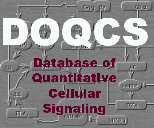
|
Enter a Search String | | Special character and space not allowed in the query term.
Search string should be at least 2 characters long. |
Molecule Parameter List for PKC-cytosolic | The statistics table lists the distribution of a molecule acting either as a substrate, product, enzyme or as a molecule within the network.
The text color of a molecule is highlighted by  color. color. | | Statistics |
Accession and Pathway Details | |
| Accession Name | Accession No. | Accession Type | Pathway Link | | PKC_turnover | 26 | Pathway |
PKC | | This model is a superset of the PKC model presented in Bhalla US and Iyengar R. Science (1999) 283(5400):381-7. The current version includes PKC turnover. This version includes the stimulating pools Ca, AA and DAG as well as the PKC activity within the synaptic signaling pathway since it is meant to be a self-contained pathway model rather than part of a network. |
PKC-cytosolic acting as a Molecule in PKC_turnover Network
| Name | Accession Name | Pathway Name | Initial Conc.
(uM) | Volume
(fL) | Buffered | | PKC-cytosolic | PKC_turnover
Accession No. : 26 | PKC
Pathway No. : 138 | 1 | 1000 | No | | Marquez et al J. Immun 149,2560(92) est 1e6/cell for chromaffin cells Kikkawa et al 1982 JBC 257(22):13341 have PKC levels in brain at about 1 uM. The cytosolic form is the inactive PKC. This is really a composite of three isoforms: alpha, beta and gamma which have slightly different properties and respond to different combinations of Ca, AA and DAG. |
PKC-cytosolic acting as a Substrate in a reaction in PKC_turnover Network
| Kd is calculated only for second order reactions, like nA+nB <->nC or nA<->nC+nD, where n is number and A,B,C,D are molecules, where as for first order reactions Keq is calculated.
Kd for higher order reaction are not consider. |
| | Name | Accession Name | Pathway Name | Kf | Kb | Kd | tau | Reagents | | 1 | PKC-act-by-Ca | PKC_turnover
Accession No. : 26 | PKC
Pathway No. : 138 | 0.6
(uM^-1 s^-1) | 0.5
(s^-1) | Kd(bf) = 0.8333(uM) | - | Substrate
Ca
PKC-cytosolic
Product
PKC-Ca
| | | This Kd is a straightforward result from the Schaechter and Benowitz 1993 J Neurosci 13(10):4361 curves. The time-course is based on the known rapid activation of PKC and also the fact that Ca association with proteins is typicmpdmyy quite fast. My guess is that this tau of 2 sec is quite conservative and the actualy rate may be much faster. The parameter is quite insensitive for most stimuli. | | 2 | PKC-basal-act | PKC_turnover
Accession No. : 26 | PKC
Pathway No. : 138 | 1
(s^-1) | 50
(s^-1) | Keq = 50(uM) | 0.02sec | Substrate
PKC-cytosolic
Product
PKC-basal*
| | | Basal activity of PKC is quite high, about 10% of max. See Schaechter and Benowitz 1993 J Neurosci 13(10):4361 and Shinomura et al 1991 PNAS 88:5149-5153. This is partly due to basal levels of DAG, AA and Ca, but even when these are taken into account (see the derivations as per the PKC general notes) there is a small basal activity still to be accounted for. This reaction handles it by giving a 2% activity at baseline. | | 3 | PKC-act-by-AA | PKC_turnover
Accession No. : 26 | PKC
Pathway No. : 138 | 0.0001
(uM^-1 s^-1) | 0.1
(s^-1) | Kd(bf) = 833.3333(uM) | - | Substrate
AA
PKC-cytosolic
Product
PKC-AA*
| | | AA stimulates PKC activity even at rather low Ca. Schaechter and Benowitz 1993 J Neurosci 13(10):4361 Note that this one reaction combines the initial interaction and also membrane translocation. | | 4 | PKC-n-DAG | PKC_turnover
Accession No. : 26 | PKC
Pathway No. : 138 | 0.0006
(uM^-1 s^-1) | 0.1
(s^-1) | Kd(bf) = 166.6667(uM) | - | Substrate
DAG
PKC-cytosolic
Product
PKC-DAG
| | | Binding of PKC to DAG, non-Ca dependent. Kf based on Shinomura et al PNAS 88 5149-5153 1991 Tau estimated as fast and here it is about the same time-course as the formation of DAG so it will not be rate-limiting. |
PKC-cytosolic acting as a Product in a reaction in PKC_turnover Network
| Kd is calculated only for second order reactions, like nA+nB <->nC or nA<->nC+nD, where n is number and A,B,C,D are molecules, where as for first order reactions Keq is calculated.
Kd for higher order reaction are not consider. |
| Name | Accession Name | Pathway Name | Kf | Kb | Kd | tau | Reagents | | PKC-synthesis | PKC_turnover
Accession No. : 26 | PKC
Pathway No. : 138 | 0
(s^-1) | 0
(s^-1) | - | - | Substrate
PKC-RNA
Product
PKC-cytosolic
| | This rate is set up to balance the removal of PKC at resting PKC levels of about 0.09 uM. |
| Database compilation and code copyright (C) 2022, Upinder S. Bhalla and NCBS/TIFR
This Copyright is applied to ensure that the contents of this database remain freely available. Please see FAQ for details. |
|
